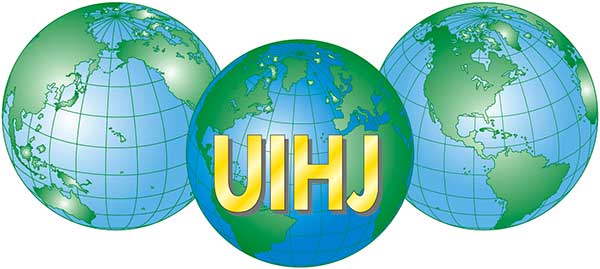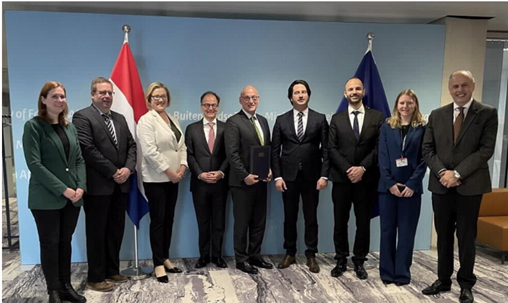July 2-5, 2024 – The UIHJ, represented by Jos Uitdehaag, First Vice-President, and Patrick Gielen, Secretary of the Board (also representing Belgium), participated in the Special Commission on the practical operation of the Hague Convention of November 15, 1965, on the service abroad of judicial and extrajudicial documents in civil or commercial matters (Notification Convention), the Hague Convention of March 18, 1970, on the taking of evidence abroad in civil or commercial matters (EvideThnce Convention), and the Hague Convention of October 25, 1980, on International Access to Justice. The meeting was held in The Hague (NL) from July 2-5, 2024.
The meeting brought together 260 delegates in person and online, representing 55 HCCH members, two non-member Contracting Parties, one observer state, observers from seven intergovernmental organizations, and 13 international non-governmental organizations, as well as members of the Permanent Bureau.
The opening was made by Mr. Paul Vlas, President of the Dutch State Commission on Private International Law, who welcomed all delegations and emphasized the importance of international cooperation as a guarantee of the effectiveness of cross-border justice.
In his opening speech, Secretary-General Christophe Bernasconi indicated that the three conventions discussed during this special commission are the most used by member countries. They increase legal certainty in an ever-changing world.
The Hague Convention of March 18, 1970, on the Taking of Evidence Abroad in Civil or Commercial Matters (Evidence Convention)
It should be noted that 63% of the Contracting Parties (42 out of 64) responded to the questionnaire sent in 2022 by the Permanent Bureau.
The opinion on the Evidence Convention is excellent for nearly all respondents. The first day of the Special Commission was entirely devoted to the evidence regulation.
A fruitful exchange took place among all parties to enhance international collaboration in matters of evidence.
There is a strong desire to move towards digitalization and reduce paper usage.
Recommendation
A recommendation (specifically Recommendation 42) approved by the Special Commission deserves particular attention for judicial officers in the context of the designation of judicial and other authorities referred to in Article 1 of the convention:
Recommendation 42: “The Special Commission notes that for the purpose of obtaining evidence, the requesting authorities include not only courts and judges but also other persons (such as notaries) who may, in some Contracting Parties, perform functions similar to those of judicial authorities. State Profiles should contain information about these persons.”
Thus, judicial officers could be designated to participate due to their expertise in conducting statements of facts, thereby providing evidence in cross-border procedures.
The Hague Convention of November 15, 1965, on the Service Abroad of Judicial and Extrajudicial Documents in Civil or Commercial Matters (Notification Convention)
Questionnaire Results Presentation
In 2014, during the last Special Commission, there were 68 Contracting Parties, while in 2024, this number increased to 84, marking an increase of 16 parties or 24%.
The responses received to the questionnaire sent by the Permanent Bureau came from 29 European countries, 12 Asian countries, and 7 countries from the Americas. The general feedback is good or excellent, with only two suggestions for improvement and two satisfactory evaluations.
There are no major problems in interpreting civil and commercial matters. However, 19% of requests were refused for reasons of sovereignty or security.
Between 2017 and 2021, the number of cases handled annually was about 40,000 to 45,000.
Regarding the processing times for requests, 37% of cases are handled within 1 to 3 months, 45% within 3 to 6 months, 7% within 6 to 12 months, and 7% in less than one month. Electronic procedures prove to be faster than those conducted by mail.
COVID-19 Impact
The COVID-19 pandemic resulted in more countries accepting email submissions, notably Israel, Spain, China, Canada, Belgium, and the USA, with volumes varying from 0 to 500 to 2500.
A working group was formed to address several aspects:
– Use of IT, including email service and electronic signatures.
– Service upon a foreign state or state official.
– Contractual waiver.
– Substituted service.
– Definition of civil and commercial matters.
– Outdated terminology in the manual, particularly “notification parquet.”
Functioning of Central Authorities
Experiences and challenges faced by various countries (USA, Israel, Belgium, Canada, etc.) were shared.
It was concluded that there is a need to generalize the use of emails in sending missions and improve address searches.
Delays, Costs, and Payment Methods
Discussions also focused on execution times, costs, and payment methods, with proposals to encourage electronic payments and avoid checks and other outdated payment methods.
Reasons for Refusal and Diplomatic Channels
The reasons for refusal of service requests and the use of diplomatic channels (Articles 8 and 9) were discussed, with a consensus on the importance of communication and respect for central authorities.
Email Notification (Article 10(a))
The UIHJ emphasized the difference between transmission and service, calling for a framework for electronic service. Discussions took place on the acceptability of email as a method of service, with varying positions among member countries.
Development of Articles 10(b) and 10(c)
The UIHJ introduced the key role of judicial officers in service, emphasizing that service is the first important step in a judicial procedure and that the use of transmission methods significantly accelerates cross-border notification.
Following the UIHJ’s presentation, Secretary-General Christophe Bernasconi recommended that Contracting Parties reconsider objections to Articles 10(b) and 10(c), which would allow for faster and more efficient cross-border notification.
No objections were raised by the Contracting Parties to the Secretary-General’s proposal to review positions on opposition to Articles 10(b) and 10(c).
Civil and Commercial Matters
This notion must be interpreted broadly. The interpretation of the term “civil and commercial” has been on the Special Commission’s agenda since 1970 and often raises debates.
The interpretation can vary from one judicial system to another and must be clarified in a clear and precise manner to guarantee legal certainty. The Permanent Bureau requests that this notion be interpreted as broadly as possible and considers that “civil and commercial matters” should be interpreted autonomously.
Recommendations
Two recommendations (specifically Recommendations 108 and 109) approved by the Special Commission deserve particular attention for judicial officers in the context of the application of Article 10(b) and (c) of the Notification Convention:
Recommendation 108: “The Special Commission notes the practical importance of the forms of notification provided by the Convention under Articles 10(b) and (c), particularly concerning the prompt execution of requests. The Special Commission encourages Contracting Parties to review and reconsider their opposition to the use of these methods.”
Recommendation 109: “The Special Commission recommends that individuals transmitting requests for notification under Articles 10(b) or (c) consult with the authorities of the destination state before sending a request to correctly identify the person to whom the request should be sent.”
We can also highlight the recommendation regarding assistance in address searches, which states the following:
Recommendation 76: “Recognizing that it is not mandatory to assist in locating the recipient of a document to be served under the Convention, the Special Commission notes that some Contracting Parties have indicated they use various practices to provide assistance, as the requested State, when the recipient’s address is incomplete or incorrect. Some have even specified that they offer help when the address is unknown. The Special Commission encourages Contracting Parties to help in accordance with their legal and structural capabilities when able. The Special Commission also encourages Contracting Parties to indicate the availability of such assistance in their State Profile and include information on the different methods for locating the recipient.”
This demonstrates the potential for judicial officers to be designated to participate due to their expertise in conducting observations, thereby providing evidence in cross-border procedures.
Conclusion
The Special Commission highlighted the progress made and the remaining challenges in implementing the conventions, with a focus on digitalization and improving international cooperation for more effective justice.
The two working groups will now continue their work to finalize the two practical manuals as soon as possible.












